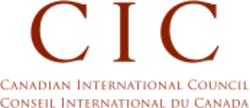Canadian International Council
(Think-tank) | |
|---|---|
 | |
| Formation | 1928 |
| Headquarters | Toronto, Canada |
| Subpage | •Canadian International Council/President |
| Membership | • James Appleyard • Glenn Davidson • David Dyment • Patricia Fortier • William C. Graham • Renald Grégoire • Nicholas Hirst • Chris Kilford • Hélène Laverdière • Sheryl Lightfoot • Ruth Mojeed • Maureen O’Neil • Nicolas M. Rouleau • Aphrodite Salas • Gerald Wright |
| Influential Canadian think tank on foreign relations. | |
The Canadian International Council (CIC) is a Canada think tank on foreign relations. It is an independent, member-based council established to strengthen Canada's role in international affairs. Its stated goal is "to advance debate on international issues across academic disciplines, policy areas, and economic sectors."
Most of the institute leaders, from Escott Reid and John Holmes in the early decades to Alan Sullivan and Barbara McDougall in more recent times, have also had senior posts in the government foreign policy establishment.
History
On January 30, 1928, a group of prominent Canadians met at Glensmere House in Ottawa, the home of former Prime Minister Sir Robert Borden, to form the Canadian Institute of International Affairs (CIIA), the predecessor of the Canadian International Council (CIC).
Present at this inaugural meeting, where the organization’s first constitution was promulgated, were: Sir Robert Borden (Canada’s eighth prime minister), Frederick N. Southam (the head of the Southam Newspaper Group); John W. Dafoe (editor of the Winnipeg Free Press), General Sir Arthur Currie (commander of the Canadian Corps in World War I and later McGill University president); John Nelson (journalist and co-founder of the Canadian Press); Sir Joseph Flavelle (business leader and chairman of the Imperial Bank of Commerce); Newton W. Rowell (Ontario Liberal Party leader and Canadian delegate to the League of Nations); Reginald W. Brock (director of the Geological Survey of Canada); N .A. M. MacKenzie (university leader and Member of Parliament); C. A. Bowman (CBC broadcasting pioneer); Charles S. MacInnes (prominent lawyer); Rev. John MacKay (principal of Manitoba College, forerunner of the University of Manitoba); and Stanley Brent (YMCA general secretary).
Borden was appointed by the group as the inaugural chairman of the institute, which initially comprised five branches and 144 members. Embedded in the CIIA’s constitution were two fundamental bylaws: First, that the purpose of the CIIA was “To promote a broader and deeper understanding of international affairs and of Canada’s role in a changing world by providing interested Canadians with a non-partisan, nation-wide forum for informed discussion, debate and analysis.” And, second, that membership in the organization should be confined to British subjects. While the second bylaw was eventually annulled, the original purpose of the organization set out almost nine decades ago has remained the same[1].
The CIIA used funding from the Rockefeller Foundation, the Ford Foundation and the Carnegie Corporation from 1936 to 1955 to drive the growth of the organization, expanding its research and public education programs and recruiting a roster of prominent foreign policy specialists. The institute played host to some of the most contentious foreign policy debates of this era, from Canada’s decision to enter World War II to the country’s role in shaping the post-World War II global order.
Members
The board members (listed above) are per January 2021.[2]
Employee on Wikispooks
| Employee | Job | Appointed | End | Description |
|---|---|---|---|---|
| Barbara McDougall | Canadian International Council/President | 1999 | 2004 | At the time still Canadian Institute of International Affairs |